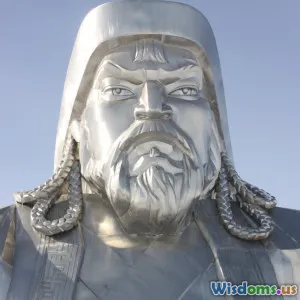
Historical Figures Who Inspired Generations
8 min read Explore remarkable historical figures whose legacies have inspired generations and shaped the world as we know it. (0 Reviews)
Historical Figures Who Inspired Generations
Introduction
Throughout the tapestry of history, some individuals rise beyond their time to become beacons of inspiration for generations to come. These figures—whether rulers, revolutionaries, thinkers, or artists—have not merely left behind stories but legacies that continue to shape our world today. Their courage, vision, and transformative actions invite us to look deeper into how one person’s conviction can influence countless lives centuries later. This article explores several renowned historical personalities who have profoundly impacted societies, cultures, and ideologies worldwide.
Visionary Leaders Who Changed the Course of History
Mahatma Gandhi: The Architect of Nonviolent Resistance
Mohandas Karamchand Gandhi, better known as Mahatma Gandhi, championed the principle of ahimsa, or nonviolence, against the colonial might of the British Empire in India. His steadfast commitment to peaceful civil disobedience galvanized millions toward Indian independence. Gandhi’s Salt March in 1930 is emblematic of how symbolic acts can inspire mass movements. Beyond India, his philosophy influenced global civil rights leaders such as Martin Luther King Jr. and Nelson Mandela, demonstrating that courageous leadership powered by principle can dismantle even the most entrenched injustice.
Abraham Lincoln: Preserving a Nation Through Crisis
Abraham Lincoln, the 16th President of the United States, is renowned for his leadership during the American Civil War and the abolition of slavery. His Gettysburg Address remains one of the most eloquent articulations of democracy and human equality. Lincoln's capacity for empathy and unwavering dedication to uniting a fractured nation show how steadfast leadership during tumultuous times can preserve ideals that resonate throughout history.
Innovators and Thinkers Who Shaped Civilization
Leonardo da Vinci: The Renaissance Polymath
Leonardo da Vinci epitomizes the spirit of the Renaissance—embodying curiosity, artistic genius, and scientific inquiry. His notebooks, filled with anatomical sketches, engineering designs, and artistic masterpieces like the Mona Lisa, reveal a mind centuries ahead of its time. Da Vinci’s interdisciplinary approach illustrates the power of curiosity and lifelong learning, inspiring generations of artists, scientists, and inventors alike.
Marie Curie: A Pioneer in Science
Marie Curie broke barriers as the first woman to win a Nobel Prize and remains the only person awarded Nobel Prizes in two different scientific fields: physics and chemistry. Her discovery of radioactivity fundamentally transformed medicine and physics. Curie’s determination in a male-dominated scientific community underscores the importance of persistence and intellectual courage for advancing human knowledge.
Revolutionaries Who Redefined Societies
Nelson Mandela: A Symbol of Reconciliation
Imprisoned for 27 years for opposing apartheid, Nelson Mandela emerged as a global icon for peace and reconciliation. As South Africa’s first Black president, he guided the country through a challenging transition, emphasizing forgiveness over vengeance. Mandela’s famous assertion, “It always seems impossible until it’s done,” continues to inspire activists fighting oppression worldwide.
Joan of Arc: The Warrior Martyr
Joan of Arc, a peasant girl who claimed divine guidance, led French forces to crucial victories during the Hundred Years’ War. Her courage against overwhelming odds and steadfast faith have immortalized her as a symbol of bravery, conviction, and national pride. Her story exemplifies how belief in a cause—regardless of background—can inspire profound change.
Cultural Icons Who Transcended Their Craft
William Shakespeare: Master of the Human Experience
William Shakespeare's exploration of human emotions, power dynamics, and morality remain unparalleled in literature. His works, such as Hamlet, Macbeth, and Romeo and Juliet, are cornerstones of Western culture. Shakespeare’s ability to capture universal truths about the human condition continues to influence writers, performers, and audiences worldwide, transcending centuries and language barriers.
Frida Kahlo: Art as a Testament to Life and Identity
Frida Kahlo’s vivid self-portraits and exploration of identity, pain, and Mexican heritage have earned her a place as a feminist and cultural icon. Her ability to channel personal suffering into groundbreaking artistic expression has inspired generations of artists and activists to embrace authenticity and challenge societal norms.
Lessons from These Historical Legends
These figures teach us that influence arises not merely from power but from commitment to ideals, originality, resilience, and empathy. Their lives illustrate lessons such as:
- Courage in the face of adversity: Whether fighting colonial rulers, social outcasts, or institutional barriers, their bravery paved paths toward justice and progress.
- Innovation and lifelong learning: Intellectual curiosity and breaking boundaries define transformative figures like Leonardo da Vinci and Marie Curie.
- The power of reconciliation: Mandela’s leadership shows that idealism coupled with pragmatism can heal divisions.
- Cultural impact: The arts and literature wield enormous influence in shaping societies and preserving values across generations.
Conclusion
History is not simply a record of past events but a repository of inspiration. The legacies of these historical figures remind us that individual actions—fueled by vision, determination, and moral clarity—possess the power to inspire generations and shape the human story. By studying their lives and values in detail, we gain not only knowledge but a source of motivation to confront contemporary challenges with a similar spirit of courage and purpose. Let these timeless examples encourage each of us to make meaningful contributions to our communities and world.
"The past cannot be changed. The future is yet in your power." — Mary Pickford
Their stories remain beacons lighting the way for those daring to dream and make a difference.
", "categories": ["Leadership", "Innovation"], "tags": ["Inspiration", "Legacy", "Historical Impact", "Motivation"], "keywords": "historical figures, inspiration, legacy" } } }
History & Great Figures
Rate the Post
User Reviews
Popular Posts




















